Archive
Posts Tagged ‘barbara kimmel’
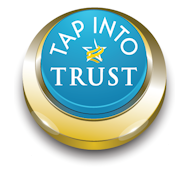 Two significant news headlines recently caught my attention:
Two significant news headlines recently caught my attention:
Why 2020 Will See the Birth of the Trust Economy (World Economic Forum)
Covid-19 Vaccine Push Lacks a Key Ingredient: Trust (Bloomberg) (links below)
Missing from both articles is a 1) A concise definition of trust and 2) a comprehensive solution.
We define trust as the OUTCOME of principled behavior.
Trust is:
- Always built from the inside out by ethical leaders.
- It cannot be delegated.
- It should not be the subject of a PR or marketing campaign.
- It cannot be measured through external surveys (that is perception of trust)
- It is not “one size fits all.”
Our global Trust Alliance comprised of business leaders, departmental managers, consultants and scholars worked collaboratively for over a year (2017-18) to identify the primary behaviors driving trust in teams and organizations. These 12 behaviors are our Trust Alliance Principles (TAP) and they have now been accessed, at no cost, over 140,000 times in *16 languages. The weakest behaviors break trust. Administering our AIM Assessment has shown that from team to team and organization to organization, these weak behaviors vary. In other words, elevating trust is not “one size fits all.”
AIM (an acronym for Acknowledge, Identify, Mend) uses the TAP behaviors to identify those that are breaking trust in order to have a starting place to begin a discussion on how to fix them. (We also provide resources to help our clients quickly resolve the primary weaknesses.)
Leaders and managers who acknowledge that trust is critical to organizational success and choose to elevate it to avoid the next expensive crisis, can do so in 3 steps with an inexpensive plan:
- Identify what you believe may need fixing by starting with the checklist below.
- Take our 1 minute master survey “Building Trust One Principle at a Time” to determine how your answers compare with over 500 respondents.
- Administer our AIM Survey to your team and start a trust discussion by holding a workshop.
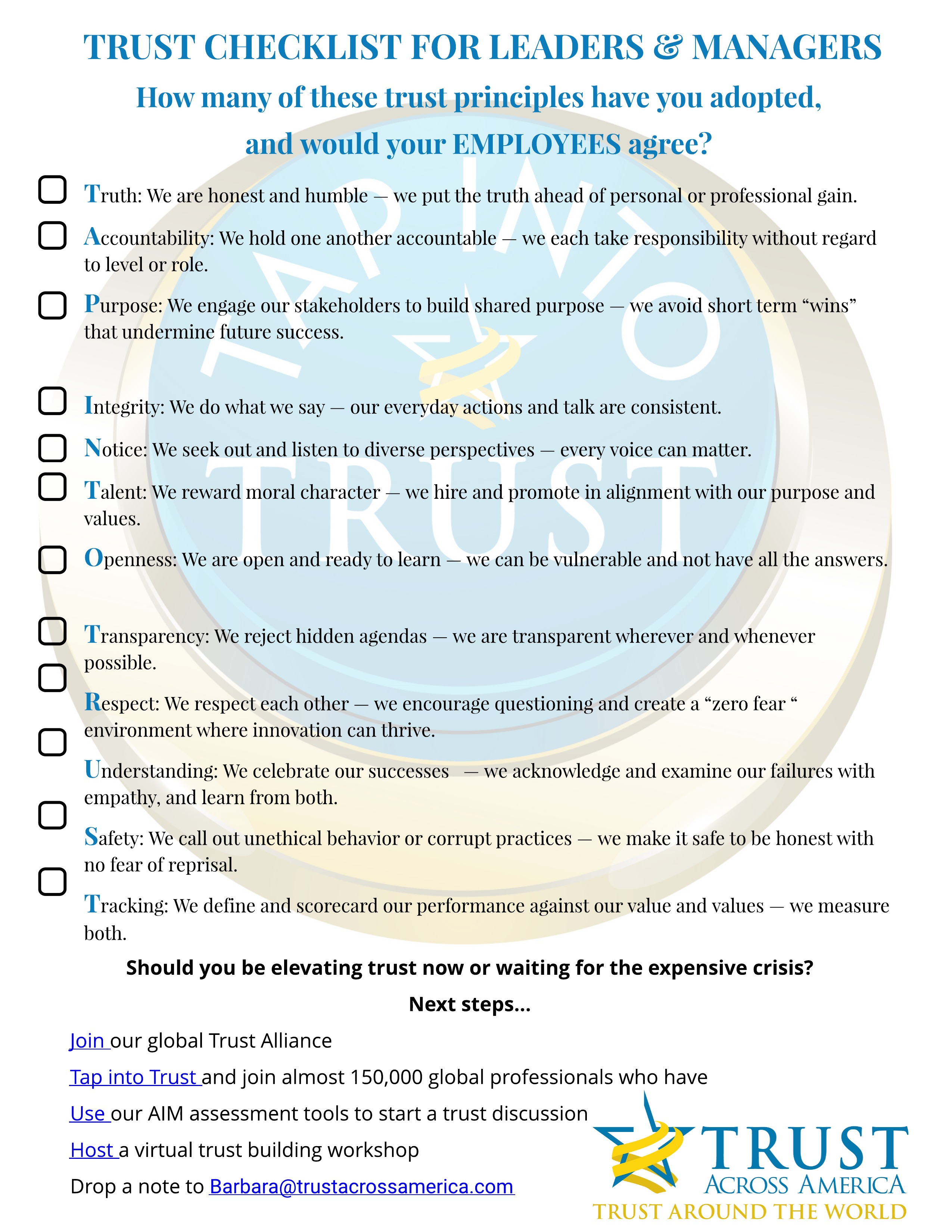
Barbara Brooks Kimmel is the founder of Trust Across America-Trust Around the World, whose mission is to help organizations build trust. Now in its 12th year, the program has developed two proprietary trust-evaluation tools, the latest is AIM Towards Trust. She also runs the world largest global Trust Alliance and is the editor of the award-winning TRUST INC. book series. Kimmel is a former consultant to McKinsey who has worked across multiple industries and with senior leadership. She holds a bachelor’s in international affairs from Lafayette College and an MBA from Baruch.
Copyright © 2020, Next Decade, Inc.
Articles cited:
www.weforum.org/agenda/2020/08/2020-birth-of-the-trust-economy/
www.bloomberg.com/opinion/articles/2020-08-17/warp-speed-s-covid-19-vaccine-push-lacks-a-key-ingredient-trust
*Download our principles as a PDF: English, Arabic, Chinese, Dutch, Finnish, French, German, Hebrew, Hindi, Italian, Japanese, Portuguese (Brazilian), Romanian, Russian, Spanish, and Swedish
Barbara Brooks Kimmel, barbara kimmel, leadership, organizational trust, trust across america
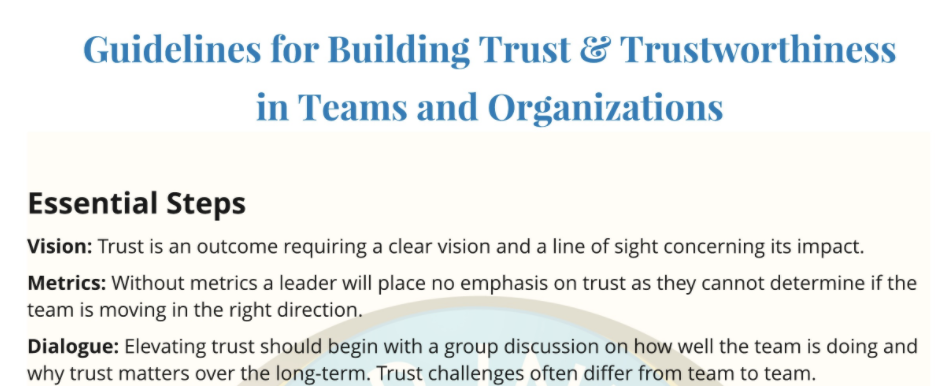 “Trust has to be earned, and should come only after the passage of time.”– Arthur Ashe
“Trust has to be earned, and should come only after the passage of time.”– Arthur Ashe
Performing a quick review of recent news headlines on trust repair and restoration returns the following results:
Restore Trust in Science
Pittsburgh Diocese to do More to Restore Trust
Can a Blockchain Timestamp Help Rebuild Trust
Fair and Unbiased Reporting Will Restore Trust in Media
Mayor Peter Gets Hired by Notre Dame to Restore Trust in Politics
Zuckerberg Has a Lot of Work To do To Restore Public Trust in Facebook
These headlines might lead the average reader to believe that, at one point, the referenced societal institutions had built trust and have now lost it. For others including me, they are a naive attention grabbing media tool, serving no purpose and misleading most readers. It’s simply not possible to rebuild or restore something that was ignored during the organizational construction phase.
Building trust should never be used as a crisis response or news headline following a reputation hit.
Trust doesn’t work that way. It is always proactive, intentional and deliberate and trust is built:
- Through ethical and principled behavior modeled by leadership
- From the inside out
- Over time
- In incremental steps
A strong foundation of trust supports an even stronger “trust bank account” and ensures that reputation hits will be minimized and repair will be easy and inexpensive. It also brings many collateral benefits including:
- Elevated employee engagement and retention
- Reduced workplace stress
- Improved stakeholder relationships
- More innovation
- Better accountability, transparency and communication
- Reduced costs and elevated profits
Unfortunately the current global crisis has revealed the level to which most leaders across all societal institutions from science to business, have ignored the organizational risks that their low trust environments have created. Many are now faced with the monumental task of climbing their way out of the “trust repair trap.” While it’s never too late to start building trust, it must begin with leadership acknowledgement that the crisis response strategy to trust does not work. It never did.
Those interested in proactively elevating trust can choose to:
- Join our global Trust Alliance
- Tap into Trust and join almost 150,000 global professionals who have already done so
- Use our AIM assessment tools to start a trust discussion
- Host a virtual trust building workshop
- Or drop a note to Barbara@trustacrossamerica.com
Barbara Brooks Kimmel is the founder of Trust Across America-Trust Around the World, whose mission is to help organizations build trust. Now in its 12th year, the program has developed two proprietary trust-evaluation tools, the latest is AIM Towards Trust. She also runs the world largest global Trust Alliance and is the editor of the award-winning TRUST INC. book series. Kimmel is a former consultant to McKinsey who has worked across multiple industries and with senior leadership. She holds a bachelor’s in international affairs from Lafayette College and an MBA from Baruch.
Copyright © 2020, Next Decade, Inc.
Barbara Brooks Kimmel, barbara kimmel, leadership, organizational trust, Trust Alliance
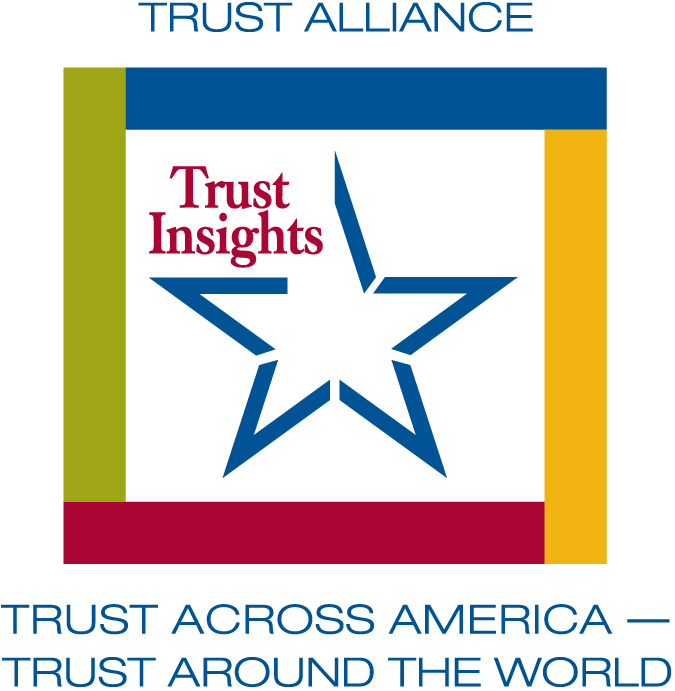 Leadership ultimately comes down to creating conditions of trust within an organization.
Leadership ultimately comes down to creating conditions of trust within an organization.
Colin Powell
In honor of Memorial Day, this week’s Trust Insight comes courtesy of Colin Powell. During this brief and concise video, Powell discusses the role trust plays in leadership:
Powell’s timeless “rules” of leadership were first printed in the August 13, 1989 issue of Parade magazine and are reproduced below.
13 Rules of Leadership
- It ain’t as bad as you think.
- Get mad, then get over it.
- Avoid having your ego so close to your position that when your position falls, your ego goes with it.
- It can be done.
- Be careful what you choose. You may get it.
- Don’t let adverse facts stand in the way of a good decision.
- You can’t make someone else’s choices.
- Check small things.
- Share credit.
- Remain calm. Be kind.
- Have a vision.
- Don’t take counsel of your fears or naysayers.
- Perpetual optimism is a force multiplier.
Please stop by our website for additional organizational trust resources, or schedule a call to learn how we can help elevate trust in your leadership team and among employees in your organization.
Did you know that over 137,000 global professionals have Tapped into Trust? Have you?
Copyright 2020, Next Decade, Inc.
Barbara Brooks Kimmel, barbara kimmel, Colin Powell, leadership, organizational trust, trust across america, Trust Inc. Strategies for Building Your Company's Most Valuable Asset

It may be no coincidence that three trust surveys were published just when the annual World Economic Forum Davos event kicked off in Switzerland. Let’s take a quick look at them:
Edelman Trust Barometer: The annual Edelman survey polls the public on the four major societal groups: government, business, NGOs and the media. The results are not so much about trust, but rather PERCEPTION of trust by members of the public who participate in the survey.
YPO Global Pulse Survey on Trust: Another global survey, this time of business leaders. Again, a measure of perception of trust, this time by business leaders.
Morning Consult: Survey of the Building Blocks of Consumer Trust in Brands: Explores the factors that are important to consumers when considering whether to trust a company. The results of this survey are quite different from the first two. I suppose it depends who you ask and how you ask your questions about trust. This survey also measures perception of trust, this time on the part of consumers.
These surveys, and others like them provide Davos attendees with some common language to talk about trust, and in many ways, that’s important, especially in a gathering of world leaders who may be thinking about “trust” for the first time. But it’s only a start.
So what’s the problem?
The problem is, and has been for over a decade, that perception of trust surveys provide no action plan for moving the needle on trust in any societal group. All they do is provide something to talk about.
And what is the solution?
If you lead any team or organization, please consider the following statements when planning an ACTIONABLE trust strategy:
- In every organization, trust is an outcome of ethical leadership, nothing else will build it. If the leader is unwilling to acknowledge that trust starts and stops with them, there is no reason to read any further.
- To elevate trust, only the leader can CHOOSE it as a business priority.
- Leaders should not confuse PURPOSE with PRINCIPLED BEHAVIOR. Principles must be addressed if purpose is to have any meaning or impact. Putting purpose before principles has the same effect as a clean shirt on a dirty body.
- Trust is built through actions not words. Modeling trust is an intentional business strategy that must be practiced and reinforced daily, and driven by leadership.
- Trust is not a marketing tool, and it can’t be delegated to compliance, HR or any other function. The leader owns it along with the Board.
- A leader cannot expect anyone in their organization to care about trust if they don’t. And if you think low trust is not a tangible risk, consider its impact on Boeing and many others who chose to ignore it.
- Trust is interpersonal, and a trustworthy culture is built from the inside out. Brand trust, data trust, AI trust and every other “buzzy” trust of the day, including “Purpose” will be natural outcomes.
- When presented with an expensive trust “solution,” by an organization that offers “trust” as one of many options, a closer look is probably in order, since its chances for long-term success are slim. Trust subject matter experts may be more difficult to identify, but locating them will be well worth the price. Don’t follow the crowd.
- Waiting until after the crisis to build trust will be very costly and in most cases, completely ineffective.
- Many leaders are proactively embracing trust as an intentional business strategy. They currently have an advantage over those who are still at the “talking” stage.
Making the decision to move beyond trust talk to trust action is a hard one. It requires not only introspection but a certain amount of vulnerability. Virtues like trust, the ones that really matter, may not be easy, but they are certainly worth exploring for those who are seeking long-term success.. Who is up for the challenge once Davos ends?
Barbara Brooks Kimmel is the Founder of Trust Across America-Trust Around the World. Now in its eleventh year, the mission is to help organizations build trust. That’s all we do.
Copyright 2020, Next Decade, Inc.
Barbara Brooks Kimmel, barbara kimmel, Board of Directors, CEO, Davos, leadership, organizational trust, trust across america, Word Economic Forum
 Tracking trust in teams and organizations and addressing trust weaknesses has the following benefits:
Tracking trust in teams and organizations and addressing trust weaknesses has the following benefits:
- Elevating employee engagement & retention
- Reducing workplace stress
- Enhancing decision making
- Increasing innovation
- Better communication
- Reducing costs and increasing profits
How many readers work on teams and in organizations with these attributes?
The growing interest in our Tap Into Trust campaign has brought over 75,000 global professionals to our universal principles, available in 16 languages, since spring 2018. We are now running the largest global (one minute/one question) anonymous survey on workplace trust, with the goal of determining which of our 12 principles of trust are the WEAKEST in teams and organizations. The anonymous survey can be taken here and the results viewed upon completion.
Building a trust based team or organization first requires leadership ACKNOWLEDGEMENT that trust is a tangible asset, not to be taken for granted, and acknowledgement remains the greatest obstacle as it requires vulnerability. If that hurdle can be overcome, then it’s simply a matter of ensuring that the right personal and interpersonal principles of trust are being, IDENTIFIED, discussed, MENDED and tracked. We call this AIM Towards Trust, and the framework is being adopted by enlightened leaders of teams and in organizations of all sizes and across industries, providing a path forward to high trust.
Elevating trust in teams and organizations requires specific personal and interpersonal principles and skills.
The weakest principles break the chain.
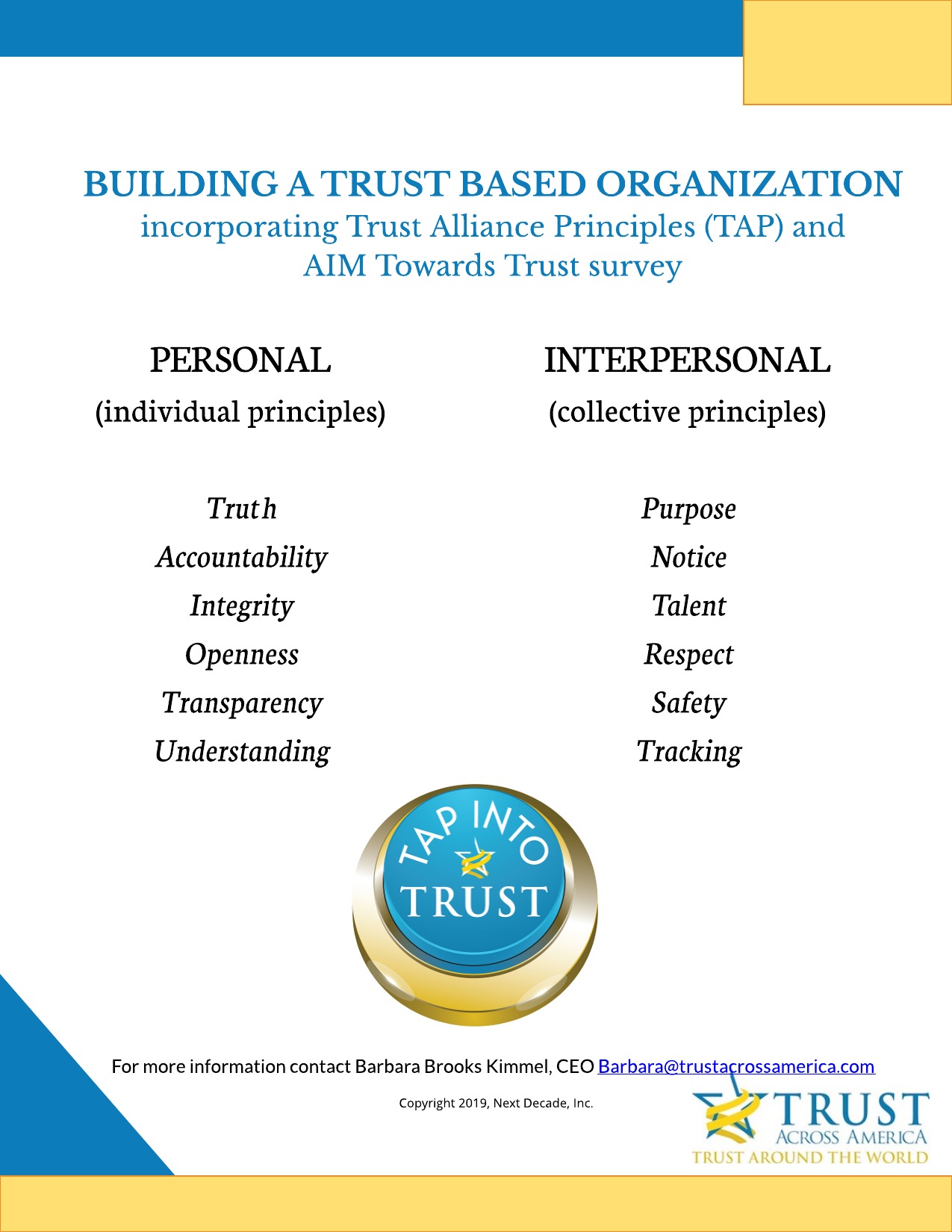
If you are still at the point of talking trust, it might be time to start acting on it. Dress down Fridays, four day work weeks, ice cream socials and “purpose” are merely work arounds.
For more information contact Barbara Brooks Kimmel, Founder, Trust Across America-Trust Around the World
Copyright 2019, Next Decade, inc.
Barbara Brooks Kimmel, barbara kimmel, leadership, organizational trust, trust across america, trustworthy behavior
 James E. Lukaszewski is widely known as America’s Crisis Guru. He offers the following timely advice about reputation and trust and the role each play in ensuring organizational success.
James E. Lukaszewski is widely known as America’s Crisis Guru. He offers the following timely advice about reputation and trust and the role each play in ensuring organizational success.
I’ve always thought that the whole notion of reputation was more a Public Relations construct than a management concern. Leaders care about trust.
During my nearly 40 years in reputation, leadership and organizational recovery I can’t recall a serious discussion of reputation in a management circumstance by those running the business until just before they were about to lose or see their reputation seriously damaged. Public Relations advisors rather than business operators raised the issues.
Trust is a powerful management term. I define trust as the absence of fear. I interpret fear to mean the absence of trust. Trust is a management word; trust is a powerful cultural word. Trust is a word that has its counterparts in virtually every culture on the planet; and trust is understood clearly and immediately by just about everybody. Generally it’s mom who taught us about trust, so we remember.
Chief Executives of troubled organizations don’t lose their jobs because there’s a reputation problem. They lose their jobs because there is a trust problem, a failure to provide the assurance that prevents the fear of serious adverse circumstances. If we’re talking seriously about our relationship with constituents, stakeholders, employees, the public, anyone who has a stake in our organization for whatever reason, we’re talking about trust.
Reputation? We’ll need to call the PR department for the latest definition.
This is an excerpt from the second of our three book Trust, Inc series.
James E. Lukaszewski (loo-ka-SHEV-skee) is widely known as America’s Crisis Guru. He is a speaker, author (12 books and hundreds of articles and monographs), lecturer and ethicist (co-chair of the PRSA Board of Ethics and Professional Standards).
For more information about our programs and how your organization can elevate trust, visit www.trustacrossamerica.com
Copyright 2019 Next Decade, Inc.
Barbara Brooks Kimmel, barbara kimmel, Board of Directors, C-Suite, Trust Inc. A Guide for Boards & C-Suites
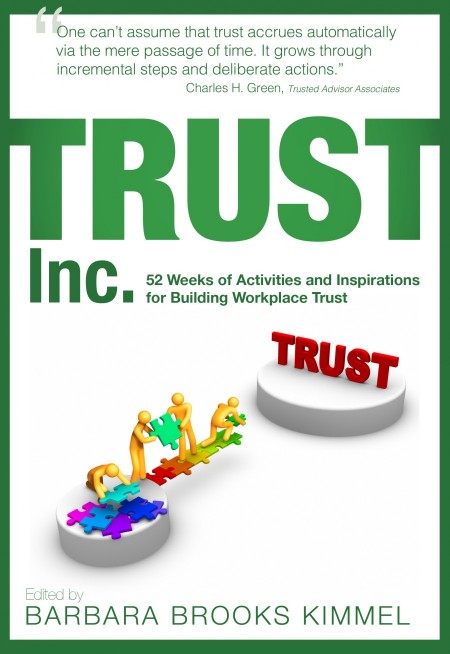 In business, it’s easy to just show up.
In business, it’s easy to just show up.
Show up at a lunch
Show up at a conference
Show up at a meeting
Show up at a webinar
Pay your annual dues
And then leave….
The outcome of showing up is usually little ventured, and probably little gained. And then we move on to the next lunch, conference, meeting or webinar.
It’s much more difficult to be involved in the planning.
Because involvement in the planning requires a commitment:
- Of time
- Of thought
- Of teamwork
But it’s the participation in the planning stage that builds the trust. In planning, we engage with others who are working towards a common goal…. a positive outcome. And this is how trust is built. And trustworthy relationships lead to new business. These relationships take time to develop, and the trust is built in incremental steps.
It’s your choice. Maintain your independence, show up and then leave. Get involved in the planning and build trust. Make the investment and the payoff may surprise you.
This is an excerpt from the third of our 3 book Trust, Inc. series:
Trust, Inc., 52 Weeks of Activities and Inspirations for Building Workplace Trust
Copyright 2019, Next Decade, Inc.
Barbara Brooks Kimmel, barbara kimmel, Trust Inc. 52 Weeks of Activities & Inspirations for Building Workplace Trust
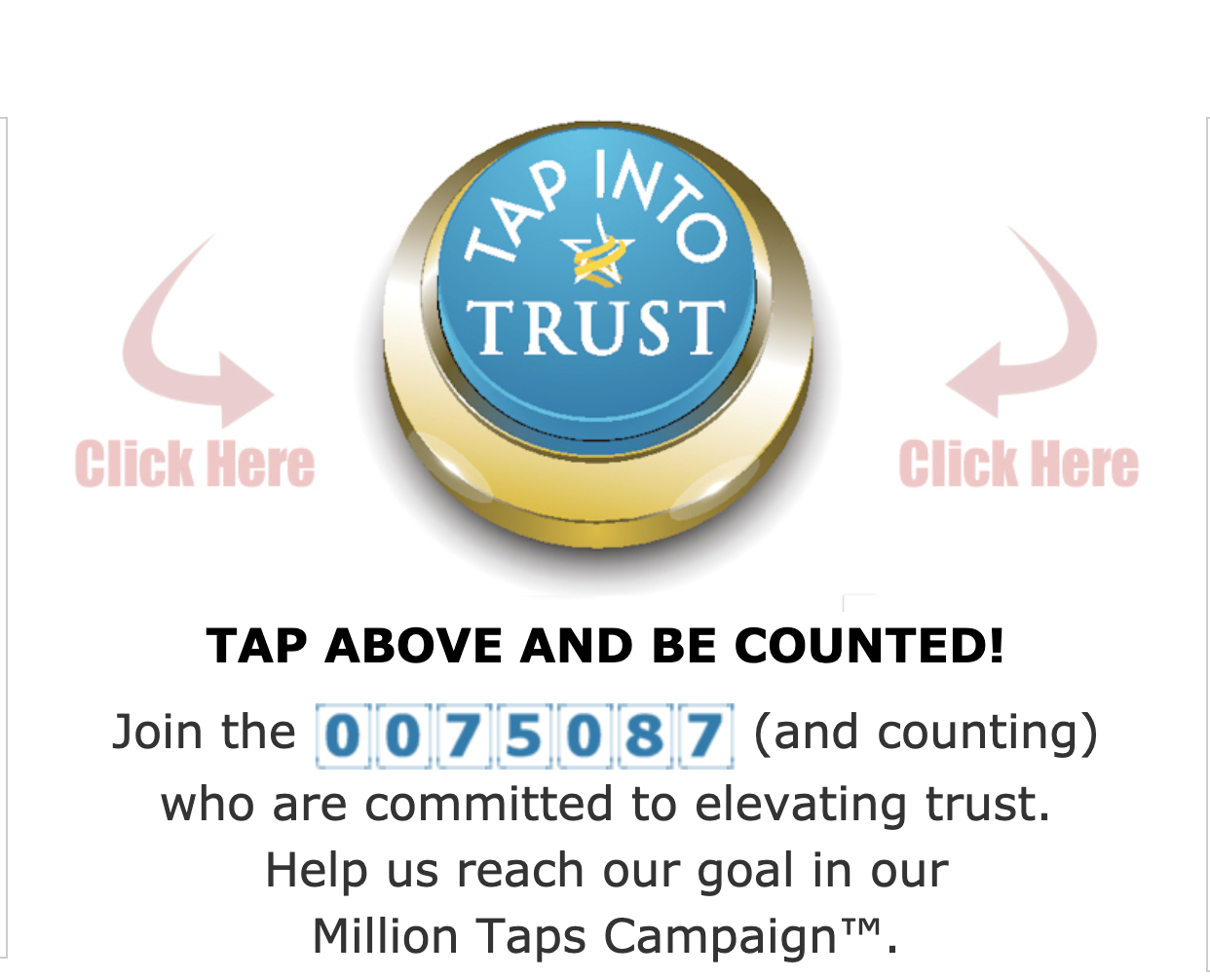
My high school friends still like to tease me that I was one of the hardest “workers” in the class. So yesterday, when we reached our 75,000 milestone, I took a deep breath and begin thinking about the next milestone and how we might get there.
Getting this far….
Our Trust Alliance, comprised of some of the world’s leading trust scholars and practitioners) spent over a year (2017-18) studying (and debating) the question of how trust is built and busted in teams and organizations, until we were able to agree on a set of universal trust elevating principles which we call TAP (Trust Alliance Principles.)
TAP is available at no cost in 16 languages and yesterday we crossed a threshold of
75,000 global views. As someone said in a recent conference call, TAP is quickly becoming the universal gold standard for elevating trust in teams and organizations. How cool is that?
Translating trust “talk” into “action”
Using the TAP principles as a framework, a suite of proprietary survey tools called
AIM Towards Trust have been created, and the surveys have been run successfully with great results in over a dozen teams and organizations in the past few months. Later this week we will be introducing this powerful tool to 700 attendees at a national conference.
I am thrilled with the progress we are making moving the needle beyond trust talk to trust action. In fact, there is no longer any justifiable excuse for ANY leader, team or organization to talk about trust, but not act on it.
As for the future, we will continue to chip away, and I will keep working hard.
Thank you for helping us reach this important milestone.
Barbara Brooks Kimmel is the Founder of Trust Across America-Trust Around the World.
Barbara Brooks Kimmel, barbara kimmel, leadership, trust, trust across america
 In this week’s Business Roundtable statement on the purpose of a corporation, IBM CEO Ginni Rometty had this to say….“Society gives each of us a license to operate. It’s a question of whether society trusts you or not. We need society to accept what it is that we do.
In this week’s Business Roundtable statement on the purpose of a corporation, IBM CEO Ginni Rometty had this to say….“Society gives each of us a license to operate. It’s a question of whether society trusts you or not. We need society to accept what it is that we do.
Yet the announcement has been met with some skepticism.
Don’t believe the Business Roundtable has changed until its CEOs’ actions match their words Fast Company
Business Roundtable Statement is Just Propaganda LA Times
Stakeholder Capitalism Will Fail if it’s Just Talk Bloomberg
Why the skepticism? Perhaps because the statement provides no specifics regarding the actions that this group of CEOs will undertake to change the way society views them and their companies, or simply that talk is cheap.
I humbly suggest, as I have been doing for over 10 years, that while “Purpose” may be easy and convenient, it does not address the “real” problem facing CEOs nor should it be the Business Roundtable’s starting point. Instead, this group of almost 200 business leaders should first take a close look at their Principles, meaning their individual and collective ethical standards, and how they apply these principles to building trustworthy organizations. Acting with the right principles leads to the right decisions, and only then can societal trust be earned. “Purpose” through check the box practices and “one off” delegated programs will simply lead to increasing skepticism.
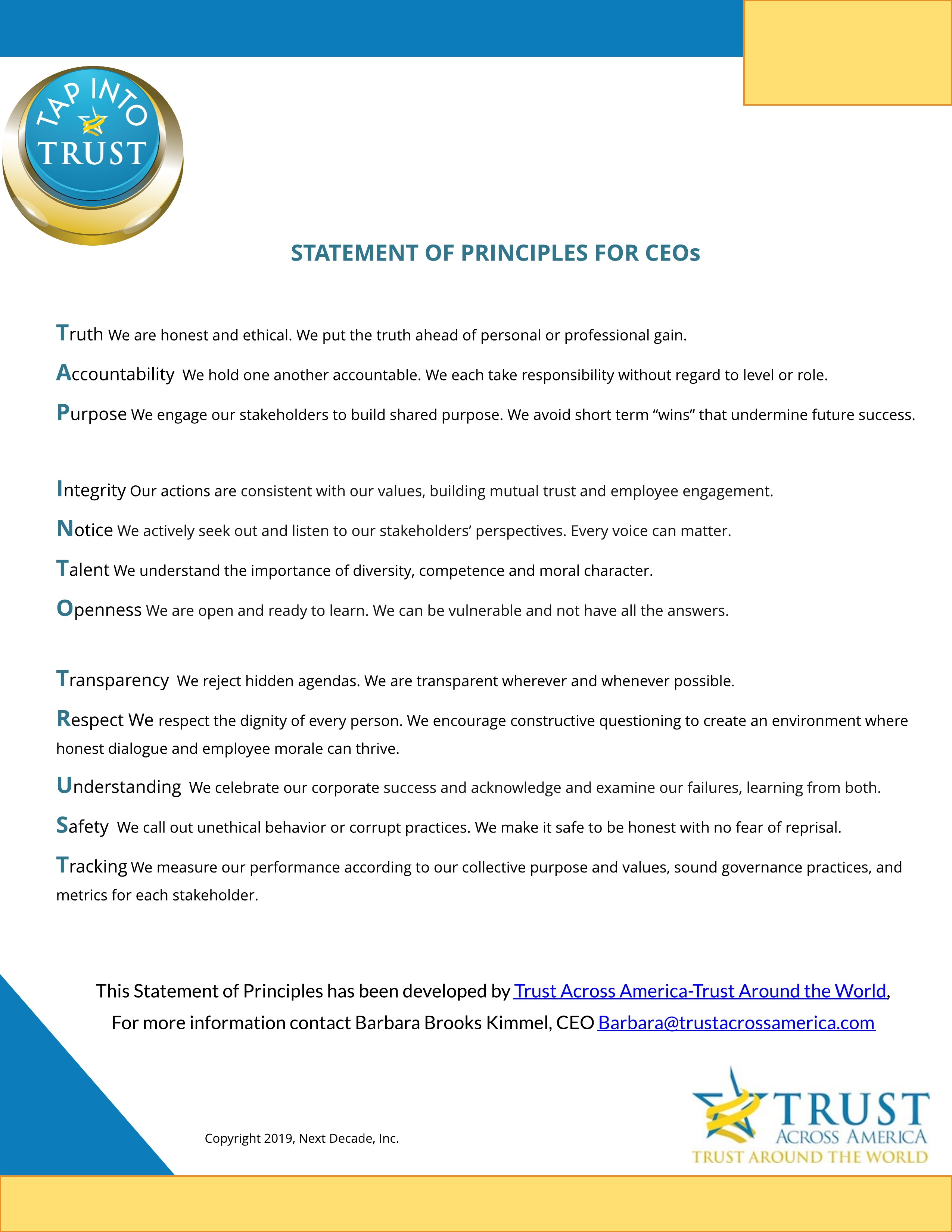
Trust Across America-Trust Around the World, offers these principles to the Business Roundtable CEOs as a guide for further discussion. A similar version designed for teams and leaders interested in starting a trust discussion has been read over 65,000 times.
Barbara Brooks Kimmel, CEO Trust Across America-Trust Around the World
Copyright 2019, Next Decade, Inc.
Barbara Brooks Kimmel, barbara kimmel, Business Roundtable, CEO, leadership, organizational trust, values
 Ideally, an internal C&E team will have great people skills and the ability to communicate and collaborate with all stakeholder groups. But if the team is ignoring the underlying principles essential to building high trust, the C&E function will be ineffective AND responsible for increasing enterprise risk.
Ideally, an internal C&E team will have great people skills and the ability to communicate and collaborate with all stakeholder groups. But if the team is ignoring the underlying principles essential to building high trust, the C&E function will be ineffective AND responsible for increasing enterprise risk.
Barbara Brooks Kimmel, CEO Trust Across America-Trust Around the World
The head of Compliance & Ethics at a large global public company recently engaged us to administer our AIM Towards Trust assessment within their 20+ member team. Unlike others who take trust for granted or consider it a soft skill, this one acknowledged that internal team trust was lacking and wanted to find out why. They sought to identify trust weaknesses and strengths, and to begin a trust discussion with the goal of remedying the weaknesses, celebrating strengths and reducing risk.
Our one question/one minute assessment is based on our universal principles called TAP (Tap Into Trust), developed over the course of a year by many of the world’s leading trust scholars and practitioners, accessed almost 65,000 times, and now in use in dozens of teams and organizations.
The survey results are displayed below. Accountability, Transparency and Respect were identified as the principles that needed immediate attention and, armed with this knowledge, the C&E Team leader was provided with additional do-it-yourself tools to address the weaknesses.
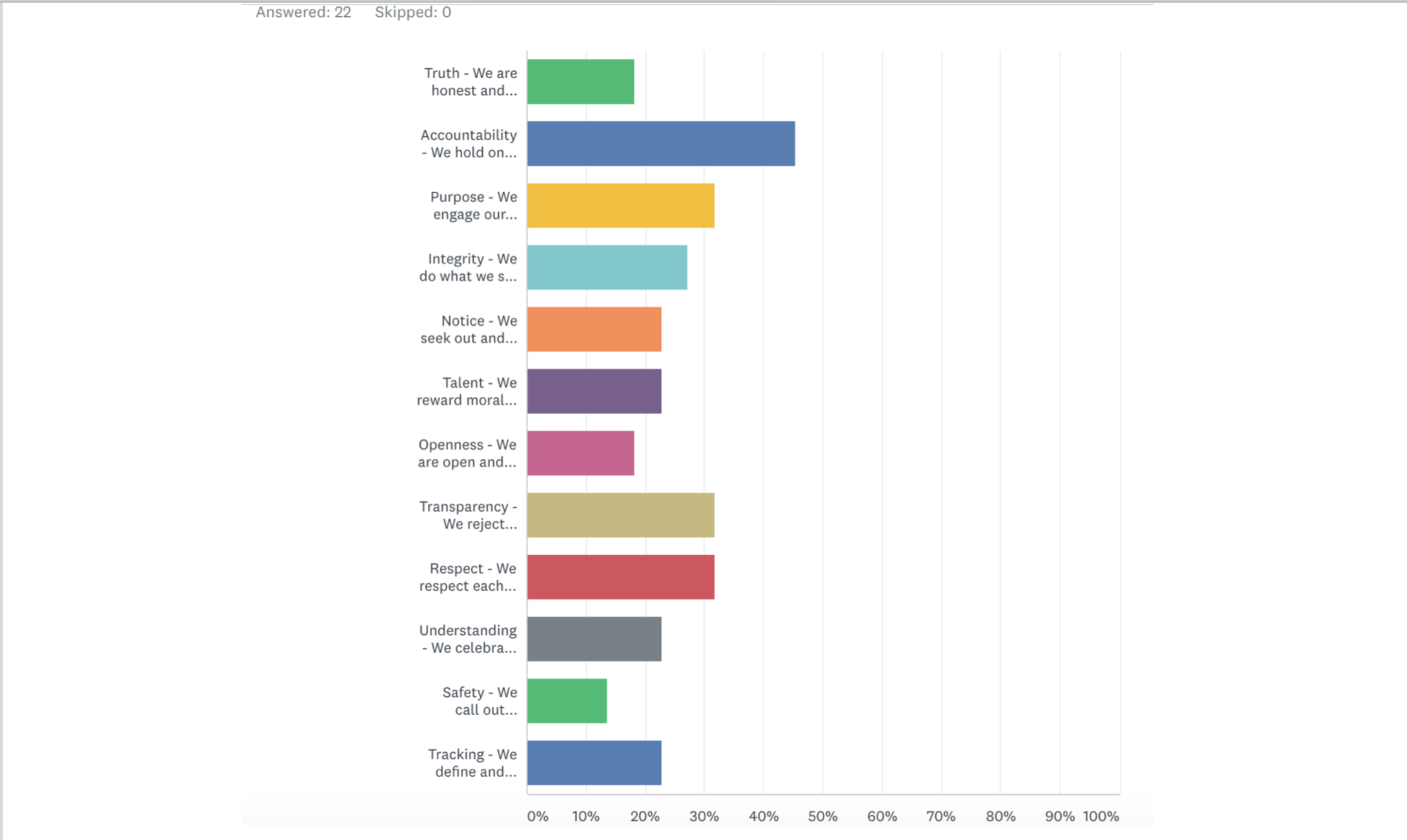
This leader believes that the responsibility to elevate organizational trust lies with their team, and is now expanding the assessment, bringing it into other functional areas within the organization to identify and remediate trust gaps.
High trust C&E teams are role models, supporting employee and customer wellbeing which, in turn fosters faster company growth and achievement of organizational goals, while minimizing risk.
What do you think the trust profile of your C&E team would look like, or would you rather not know?
While your colleagues are embracing trust as the NEW currency, are you choosing to ignore it?
Barbara Brooks Kimmel is the CEO of Trust Across America-Trust Around the World whose mission is to help organizations build trust using a proprietary assessment tool called AIM Towards Trust. A former consultant to many Fortune 500 CEOs and their firms, Barbara also runs the world’s largest global Trust Alliance, and is the editor of the award winning TRUST INC. book series and TRUST! Magazine. Barbara holds a BA in International Affairs and an MBA. For more information contact barbara@trustacrossamerica.com
Copyright 2019, Next Decade, Inc. No part of this document may be reproduced without permission.
Barbara Brooks Kimmel, barbara kimmel, compliance, ethics, leadership, organizational trust, trust, trust across america
 Two significant news headlines recently caught my attention:
Two significant news headlines recently caught my attention:













Recent Comments